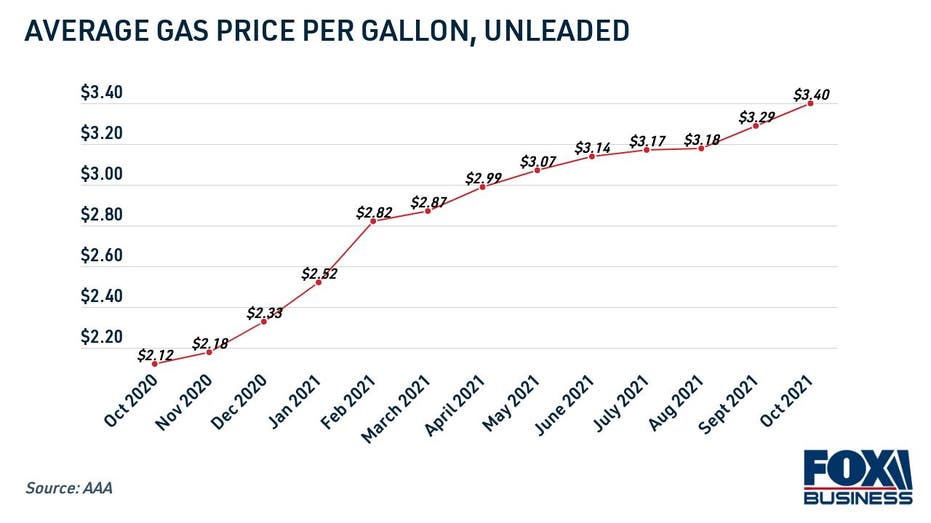As gas prices surge, here are 3 ways to make room in your budget
Learn what you can do if rising gas prices are drilling a hole in your wallet

Americans are paying $3.38 on average to fill up at the gas station, thanks to high gasoline demand, crude oil shortages and supply chain issues in oil production. But one analyst predicts that the oil industry may soon get some much-needed relief. (iStock)
Supply chain woes are causing prices on consumer goods to rise at a breakneck pace, and fuel costs are no exception. The national average price of gas rose to $3.38 for the week of Oct. 18, according to AAA data. This is the highest gasoline prices have been since September 2014.
With the U.S. economy slowly recovering from the depths of the pandemic, demand for gas is robust, but the supply is tight.
Drivers fear that average gas prices will continue to rise, but AAA spokesperson Andrew Gross says that $4 per gallon at the pump "may be a long shot." That's because as hurricane season comes to a close, the chance of a weather-related price spike decreases.
Added demand from drivers and high crude oil prices are contributing to high gas prices, Gross said. But reports that the United States has resumed negotiations on the Iranian nuclear deal caused the price of crude oil barrels to drop, which could alleviate some of the supply strain.
"Cheaper oil, lower pump prices," he added.

THESE ARE THE TOP 10 MOST STOLEN VEHICLES IN AMERICA, REPORT FINDS
Over the past week, gas prices rose the most in North Carolina and Florida (+14 cents per gallon), followed by Arizona (+12), Rhode Island and New York (+11). Average gas prices have risen well over a dollar over the past year, which results in drivers paying nearly $20 more to fill up their vehicles on average.
Fortunately, it may be possible to make room in your monthly budget by refinancing your existing debts to better terms. Borrowers may be able to save more than $600 per month on average by locking in a lower rate on their credit card debt, mortgage and student loans.
You can compare interest rates on various financial products for free on Credible without hurting your credit score. That way, you can determine if you can potentially save money on your debt payments.
HOW HURRICANE IDA CAN IMPACT YOUR HOME & AUTO INSURANCE, ACCORDING TO AN EXPERT
3 ways to cut monthly spending amid rising fuel costs
Higher gas prices can throw your monthly budget out of whack. It's not out of the realm of possibility for some commuters to be paying $100 more in field costs per month compared to this time a year ago. If you're looking for ways to cut spending in your budget, you may be able to save hundreds of dollars per month by refinancing your existing debts. Here are a few options to consider:
- Consolidate your credit card debt can save you $66 per month
- Refinance your mortgage can save you $304 per month
- Refinance your student loans can save you $253 per month
Learn more about each refinancing option in the sections below.
SENATE BLOCKS BILL TO SUSPEND DEBT LIMIT, AVERT GOVERNMENT SHUTDOWN
1. Consolidate your credit card debt
High interest credit card debt is a heavy burden on your budget, since interest interest compounds daily when you don't repay the entire statement balance. That's why many consumers choose to consolidate their credit card balances into a more predictable personal loan.
Personal loans are unsecured, lump-sum loans that you repay in fixed monthly payments over a set period of time. This can get you on a debt payoff plan that's easier to track and can even save you money over time, thanks to lower interest rates.
The average rate on credit card accounts assessed interest was 17.13% in August 2021, according to the Federal Reserve. In contrast, the average rate on a two-year personal loan was 9.39%. If you can lock in a lower interest rate on a personal loan, you may be able to pay off credit card debt faster and save money every month.
Consolidating credit card debt into a personal loan can save borrowers $66 per month on average, according to estimates from Credible. They can also save nearly $2,400 over the course of the loan.
You can see what kind of personal loan rates you qualify for on Credible's online marketplace. Use a personal loan calculator to estimate your monthly payment, so you can determine if this financial strategy is right for you.
SCHUMER REITERATES CALL FOR PRESIDENT JOE BIDEN TO CANCEL $50K OF STUDENT LOAN DEBT
2. Refinance your mortgage
Mortgage rates have been rising over the past month, but they're still relatively low, according to data from Freddie Mac. There may still be time to lock in a 3% mortgage rate on your home loan, which can save you money in the long run and on your monthly mortgage payment.
A September 2020 report from Black Knight found that the average consumer could save at least $304 per month by taking advantage of lower mortgage rates. Depending on the mortgage interest rate you can qualify for and the loan term you choose, you may be able to lower your mortgage payment, too.
Get prequalified on Credible to see your estimated mortgage rate without impacting your credit score, and use a mortgage calculator to determine how much you can save in your monthly budget.
NEW CFPB DIRECTOR BELIEVES FEDERAL GOVERNMENT SHOULD DO MORE TO CANCEL STUDENT DEBT
3. Refinance your student loans
Student loan refinancing is when you take out a new private loan to repay your current student loans at a lower interest rate. Refinancing your student debt may be able to help you reduce your monthly payment, pay off your debt faster and save money on interest charges over time.
A recent Credible analysis found that well-qualified student loan borrowers who refinanced to a longer student loan term were able to save more than $250 on their monthly payment, all without adding to the overall cost of borrowing the loan.
Keep in mind that refinancing your federal student loans would make you ineligible for certain protections like income-driven repayment (IDR), COVID-19 administrative forbearance and student loan forgiveness programs. But if you have private student loan debt, you have nothing to lose by refinancing to a lower interest rate.
Use a student loan refinancing calculator to see if this option can help balance your budget. If you're still not sure that private student loan refinancing is right for you, get in touch with a knowledgeable loan officer at Credible who can guide you through the process.
BIDEN ADMINISTRATION HAS CANCELED $1.5B IN STUDENT LOANS VIA BORROWER DEFENSE
Have a finance-related question, but don't know who to ask? Email The Credible Money Expert at moneyexpert@credible.com and your question might be answered by Credible in our Money Expert column.




















